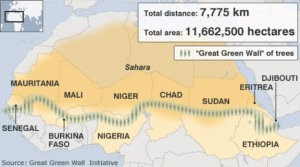The National Agency for the Great Green Wall (NAGGW) has restated commitment towards improving livelihood of communities affected by desertification and land degredation occasioned by climate change.

The Director-General of the Agency, Dr Yusuf Maina-Bukar stated this at the North-East Stakeholders’ Forum on Monday in Kano.
The theme of the forum is: “Building Multi-Stakeholders Responsiveness in the Implementation of the Great Green Wall Programme in Nigeria”.
Maina-Bukar said the agency would also adopt effective measures to counter the effects of desertification, protect natural resources and secure a brighter future for generations to come.
According to him, the agency has the core mandates to combat land degradation, desertification and improve the resilience of affected communities to the impact of climate change.
Represented by Safiyanu Yabala, Director Resource Mobilisation of the agency, Maina-Bukar said that this reflected the commitment toward fostering synergy and upscaling activities within multi-level sectors and indigenous stakeholders.
“The vision of the Great Green Wall is to create a sustainable and productive landscape that not only restores degraded lands but also promotes community development, biodiversity conservation, and resilience against climate change.
“The programme is not simply an ambitious project; it is Nigeria’s response to an urgent environmental and socio-economic crisis.
“Over the last few decades, the encroachment of the desert has had a devastating impact on our communities, threatening the livelihoods of millions and exacerbating existing conflicts,” he said.
He implored indigenous stakeholders to actively participate in shaping the future of a greener environment and communities.
According to him, the voices and perspectives are of utmost importance as they seek to implement programmes that are not only effective but also responsive to the needs and aspirations of the people.
The NGGW boss said that traditional knowledge and cultural heritage were instrumental in guiding the actions toward sustainable land management and long term resilience.
“Let today’s National Stakeholders Forum be a catalyst for heightened collaboration, increased synergy, and scaling-up of activities across the eleven frontline states.
“Together, we can build a resilient and productive landscape that will benefit both current and future generations.
“I have full confidence that, by working hand in hand, we will achieve our goals and make a lasting difference in the lives of our people,” he added.
Mr Muhammad Faw, representative of Gombe State at the meeting, said that the state governor, Inuwa Yahaya, had signed a N12 billion contract to address gully erosion, safeguard lives and preserve the environment.
The project, he said, was a step forward in the state’s collective resolve to restore the agricultural and environmental landscapes ravaged by gully erosion and environmental degradation.
Faw stressed Inuwa Yahaya dministration’s commitment to environmental sustainability through the Gombe Goes Green (3G) project.
The 3G launched in 2019, aimed at combatting desertification, deforestation, and soil erosion through annual tree planting campaign.
Also speaking, Hajiya Habiba Lau, Director Policy Planning and Coordination of the agency, said the event was critical for the agency in the life span of it’s activities across the nation.
She said the core of the Nigerian component of the GGW initiative is to reverse desertification, land degradation, and mitigate effects of climate change.
Lau urged the participants to come up with ways the agency would use to promote development at the grassroot level.
In a presentation, Prof. Nura Sani, the Deputy Vice Chencellor, Academic,Federal University, Dutse (FUD), urged the participants to explore ideas and share knowledge on how to combat desertification and land degradation to mitigate climate change.
While commending the agency for engaging the University, community and development organisations in the GGW project, Sani lauded its tree planting campaign which increases soil fertility, serves as wind break and create employment for the locals.
By Muhammad Nur Tijani
